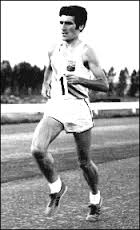
Chicago, IL. — The sport of marathoning is changing very fast around us. This Sunday at the 2014 Bank of America Chicago Marathon the 5000 & 10,000 meter world record holder Keninisa Bekele, 32, of Ethiopia will make his second career attempt over the long distance. Yet through most of its century-plus history, the marathon has been populated by men of sturdy constitution, whose examination of the distance bespoke their tenacity and grit, but whose arsenals often lacked the speed necessary to excel at the shorter events on the track.
Oh, there were outliers, like Czech great Emil Zatopek winning his debut marathon at the 1952 Helsinki Olympics, adding it to his collection of gold in the 5000 & 10,000 meters. And recall that Frank Shorter, the original father of the running boom, was every bit the top American distance track runner when he explored the marathon so successfully in the first half of the 1970s. But the norm for the distance was more like Derek Clayton of Australia, who held the marathon world record of 2:08:33 from May 1969 to December 1981, the longest stretch the record has ever lasted.

The introduction of track men coming to the marathon came when large sums of money entered the game after the initial running boom. That is when the aging oval speedsters saw the benefit of torturing themselves over the longer distance. In fact, moving up in distance became one of the standard career moves a runner made. This weekend we are celebrating the 30th anniversary of Steve Jones’ marathon world best in Chicago 1984 when, as the eighth-place finisher at the Los Angeles Olympic 10,000 meter final, Steve moved to the marathon with great success.
 But in more recent times we have seen the very best on the track make the move, highlighted by two former 5000 & 10,000 meter world record holders who went on to grab the marathon record as well. Kenya’s Paul Tergat completed his record trifecta at the 2003 Berlin Marathon, which he won in a world record 2:04:55. Five years later his great Ethiopian rival Haile Gebrselassie won Berlin in 2:03:59 to add the marathon to his long list of track and road world records.
But in more recent times we have seen the very best on the track make the move, highlighted by two former 5000 & 10,000 meter world record holders who went on to grab the marathon record as well. Kenya’s Paul Tergat completed his record trifecta at the 2003 Berlin Marathon, which he won in a world record 2:04:55. Five years later his great Ethiopian rival Haile Gebrselassie won Berlin in 2:03:59 to add the marathon to his long list of track and road world records.
But even as aging tracksters taking to the macadam has become tried and true path to success, today’s marathon fields have become littered with men who never tested their skills on the track or the grass, and have, instead, come directly to the longer distance from the half-marathon. New world record holder Dennis Kimetto may be 30 years of age, but he has only been seriously training for four years, and didn’t run his first marathon until 2012 in Berlin where he came home one step behind his training mentor Geoffrey Mutai in 2:04:16.

Then there is the real shocker, Tsegaye Mekonnen of Ethiopia, the seventeen year-old who won the Dubai Marathon 2014 in 2:04:32! 17!
The days when a track star who has lost a little off his fastball, and thinks he can move up to the marathon and expect big success may be on the wane. Not only are there fewer and fewer track 10,000s being contested in the age of the Diamond League Tour, but the lure of instant riches (by East African standards) has drawn a herd of pink-cheeked hellions to the marathon whose bodies have yet to suffer the years of wear and tear that world-class training and racing exacts, and whose psyches seem impervious to the fear the 42.2 K distance once instilled in everybody.
As Keninisa Bekele prepares to take to the Chicago start line on Sunday morning, remember that his debut marathon in Paris this spring was essentially a set-up job, organized to allow him a gentle entrance into the distance. Yet at 32K his right hamstring balked, forcing him to come off the throttle for the next 5K. According to Bekele, that cramp cost him 10-seconds per kilometer, or nearly one minute in total time.

Yet this weekend Bekele’s main challenge, at least on paper, isn’t a newbie, but one of his long-time rivals, Eliud Kipchoge, 30, of Kenya. In 2003 in Paris at the IAAF World Championships an 18 year-old Kipchoge shocked both Bekele and Morocco’s Hicham El Guerrouj the world 1500 meter record holder, to take the 5000 meter gold medal. Since then, however, Bekele is 11 and 3 against Kipchoge, mostly over 5000 meters.
A number of Chicago contenders, including Feyisa Lilesa, Tadesse Tola, Bernard Koech, one of Kipchoge’s training mates, Sammy Kitwara, and Dickson Chumba are essentially half-marathon and marathon specialists with short track resumes. The question will be whether the aging track lions can keep their bodies together to put themselves in position to use that speed when the time for winning presents itself.
END

Thank you for getting the duration of Clayton’s WR correct. It is amazing to me how many people – including many who should really know better – still think Salazar’s run at NYC that year (great though it was) was the WR.
Toni – Any summary / report on Berlin?